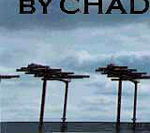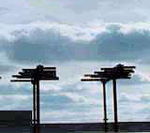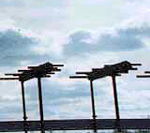|
March
16, 2001
Red
Dawn in Moldova?
In
late winter, the countryside of tiny and largely forgotten ex-Soviet
Moldova looks a bit like the aftermath of Stalin’s scorched earth
policy during the retreat from the Germans in World War II. The
low rolling hills are covered with barren orchards and untended
vineyards, the higher peaks dusted with dirty snow. In endless
rows, short shrubs reach up out of the ground like the ghastly
twisted claws of once-angry, now-dead subterranean trolls, and
the abandoned fields range in color from brown to gray to almost
black.
Dotted
around the wasteland are small villages that look mostly empty
as you drive through them. Occasionally, a local inhabitant can
be seen trudging along the side of the road carrying heavy sacks,
wearing a facial expression of half-anger, half-confusion. Children
in grubby clothes, mangy dogs, and other stray animals run around
in the softening mud. Amid the gloomy squalor and desolation,
a billboard for Western cigarettes may rise suddenly out of nowhere,
depicting young and ostensibly fashionable glamour pusses sitting
at a disco bar laughing their heads off.
A
MODEL OF REFORM
A
decade after achieving independence from the USSR, Moldova – once
the Moldavian SSR – is the poorest country in Europe according
to many reports. The number of young Moldovan women found working
as prostitutes in places like Bosnia and Kosovo (servicing the
foreign troops) is out of proportion to Moldova’s population compared
with the number from Ukraine or Russia. Recent nearby wars have
provided Moldovans with a ready market for their out-of-work young
female population – renowned for physical attractiveness. The
Moldovan wine once sold in West European supermarkets no longer
lines the shelves, making the country’s most viable export just
another casualty of corruption and obstructive EU regulations.
Estimates of the number having fled the republic range from 25%
to 40% of the population, but could be higher for all anyone knows.
Among
the economic reforms of recent years: electricity privatization.
By the end of 2000, the Moldovan government under Prime Minister
Dumitru Braghis had made plans to privatize five of the largest
electricity generating or producing enterprises. Yet, when a Spanish
company – Union Fenosa of Spain – bought three regional electricity
distributors (REDs) in Moldova, it deprived the workers in those
plants of the right to hold, use or manage any part of the property.
The Moldovan government described the Union Fenosa sales as among
"the most successful privatizations in Moldova." The
National Union of Energy Sector Workers in Moldova took a different
view, however. It appealed to the Chamber of Appeal for Justice,
insisting on the right of workers to retain 20% of the shares
in newly privatized enterprises to prevent a recurrence of the
Union Fenosa scenario.
The
Moldovan government under Braghis had also warned Moldovans in
late 2000 of the possibility that both thermo-electric power plants
(CETs) in the capital, Chisinau, would be closed if consumers
continued to "neglect to pay their bills." Maybe the
prospect of freezing to death during winter was intended to give
Moldovans an extra incentive to become "entrepreneurial"
by coming up with the money from somewhere. The government said
that private households owed a total of 192 million lei (over
$15 million) to heat provider Termocom. Not much, it might seem,
until you take into account that the average salary is less than
$50 a month ($10 for a nurse, for example).
Western
"consultants" are helping along the process of raising
prices for essential goods and services, grinding Moldovans’ faces
into the dirt. A contractor for the United States Agency for International
Development (USAID) – "International Business & Technical
Consultants, Inc." – is providing "technical assistance"
for a tender to privatize 51% of Moldtelecom, the only provider
of fixed line telecommunications services in Moldova. Soon, Moldovans
may not only be cold and eating by candlelight, but they won’t
be able to afford a phone call to tell anyone about it either.
The
only place within the internationally-recognized borders of Moldova
that still functions more or less in one piece is the separatist
region of Transnistria, a sliver of territory running north-south
to the east of the River Dniestr ("Nistru" in Romanian).
Transnistria’s leaders have pledged loyalty to Moscow since fighting
a war in 1992 that – with help from the Russian 14th
Army – left the territory under their de facto control.
The secessionist Transnistrian regime – a pariah of the West –
has since retained the breakaway republic’s Soviet-era infrastructure,
meaning the lights are still on not only in Tiraspol (the capital)
but in outlying towns as well. Meanwhile, most of Moldova west
of the Dniestr has been eking it out in darkness and (in winter)
bitter cold, in pursuit of "reform" with no visible
rewards.
WHAT
IS MOLDOVA?
Moldova
west of the Dniestr corresponds to the area historically known
as Bessarabia, named for Basarab I, who made a small principality
out of territory in present-day Romania in the first half of the
14th century. At the end of the Russo-Turkish War of
1806-12, the Ottoman Empire ceded Bessarabia to Russia. In 1919
the area became part of the Kingdom of Romania, but only until
1939, when Hitler and Stalin agreed that it should go to the USSR
under the Nazi-Soviet Pact. During World War II, pro-Nazi Romanian
forces of Gen. Antonescu’s fascist regime briefly overran the
area, to be driven by Soviet troops in 1944.
The
national identity of Moldovans today is obscure. Civic consciousness
in Moldovan society today is based less on a collective sense
of "Moldovanness" than on the mostly socialist norms
built up over half a century of Soviet rule. "Nationalist"
Moldovans claim that the republic’s future lies with glorious
Romania, even though their Orthodox Christian Church falls under
the jurisdiction of the Russian – not the Romanian – Patriarch.
Russophile Moldovans accept that Moldova probably reached its
historical zenith as part of Russian civilization. So Moldova
remains a national no-man’s land of Russian Orthodox, heavily
Sovietized Romanian-speakers mixed in with Russians, Ukrainians
and other national groups. The fleeting nationalist craze of post-independence
days seems a distant memory, as more immediate concerns of survival
long ago occupied the forefront of Moldovans’ lives.
|
Text-only
printable version of this article
Write
to Chad Nagle
Chad
Nagle is a professional writer and lawyer licensed in the District
of Columbia. He has been published in the Wall Street Journal
Europe, the Washington Times, and several other periodicals. Mr.
Nagle traveled extensively throughout the ex-USSR from 1992-97
as a research consultant. Since mid-1999, he has traveled widely
in the former Communist bloc on behalf of the British
Helsinki Human Rights Group.
His
column, At the End of History, appears alternate Fridays
on Antiwar.com.
Previous
articles by Chad Nagle
Red
Dawn in Moldova?
3/16/01
Musings
On The New Imperialism and Post-Western World Government
2/23/01
Soros:
False Prophet-At-Large
2/9/01
Belarus:
Oasis In The Heart Of Europe
1/26/01
Serbia
Joins the West
1/12/01
Death
of a Patriot
8/31/00
The
Twilight of Sovereignty in Azerbaijan
7/14/00
The
Ukrainian Model of Democracy
5/5/00
The
Slow Strangulation of Democracy in Slovakia
3/28/00
Patrick
Buchanan and the American Reformation
1/25/00
The
Betrayal of Democracy in Post-Soviet Georgia
11/30/99
|
THE
"TRIUMPH OF PROLETARIAN POWER"
On
February 25, 2001, Moldova held elections to its 101-seat parliament.
Up to then, the largest faction in the Moldovan parliament was
the 40-seat bloc controlled by the Party of Communists of the
Republic of Moldova (PCRM). Its leader, Vladimir Voronin, had
described the post-Soviet Moldovan flag as a "fascist flag,"
and heaped scorn on pro-Western "reformers" controlling
the government and parliament for ruining the country.
It
was hard to imagine ten years ago that the great Soviet Union
would be destroyed and the people of that state would begin bloody
wars, that millions of people would go jobless and would abandon
their parents’ homes to spread all over the world, and that the
remainder would become poor and deprived of their rights… This
genocide… [and] idiocy cannot continue any longer. Either the
people sweep them away, or Moldova – which just appeared on the
world’s political map – disappears.
Demonstrations
had become routine in previous months. Farmers, students, war
veterans and others staged regular protests, ignored by Western
media, against the regime. Braghis warned that the protest actions
might jeopardize financial assistance to Moldova from the IMF
and World Bank, and called on the demonstrators to cease and desist.
The amounts in question – $15 million, $35 million, $50 million
– were paltry compared with sums thrown around in other countries
of similar size. Not much would be left for Moldovans as a whole
after the reformers had tucked away their cuts in foreign bank
accounts.
Little
wonder, then, that over 50% of the electorate voted for the Communists
on election day. In the small southern city of Comrat, an old
woman on crutches told me her pension was well below subsistence
level and was seldom paid on time. Her neighbor agreed, complaining
loudly: "We don’t want a perfect life, only something a little
better than now." It was difficult to imagine that conditions
could get any worse. A polling station worker in the small village
of Mihailovka told me: "People couldn’t care less about the
geopolitical orientation of Moldova. All they want is to live
decently, have enough to eat, and drink the occasional glass of
wine." So much for Moldovans as rabid NATO-philes – a vision
conveyed by the right-wing Moldovan politicians with whom I spoke.
The
next day I learned that the Communist Party had won an absolute
majority and might take as many as 70 or 71 seats. I pondered
this historic moment as I watched the Russian news report. As
far as I knew, this was the first time in history that a Communist
Party had swept to power exclusively via "bourgeois parliamentarism."
Had pro-Western President Petru Lucinschi – former First Secretary
of Moldavian SSR and USSR Politburo member – and his proxy party,
the "Braghis Alliance," let something as trivial as
an election deprive them of office? Or was the power of
the downtrodden masses so overwhelming that even experienced old
nomenklatura political managers like Lucinschi couldn’t
stand it the way?
The
press conference that afternoon by representatives of the Council
of Europe and the Organization for Security and Cooperation in
Europe (OSCE) would surely shed light on all this, I thought.
In the town of Cimislia I’d run into a couple of Romanian OSCE
observers, one of whom said he had seen no serious problems, but
that he was "worried" by the fact that the Communists
"had their representatives in every polling station."
When I asked him why that should be a problem, since the Communists
were a party enjoying the same status as the other parties, he
became unfriendly and asked me "which organization"
I represented before walking off. The encounter – as well as my
past experience with the OSCE – left room for doubt that the West
would give a stellar review to the election. The West had never
shown much tolerance for "hard left" parties in ex-East
Bloc elections, particularly those openly professing nostalgia
for the USSR. So the attitude of the high priests of global political
correctness would have to give me a clearer picture of what was
going on. Lucinschi was our man. Could he have let us down?
First
to speak was Kimmo Kiljunen, MP from Finland and Special Coordinator
of Election Observation for the OSCE Chairman-in-Office. "These
elections in Moldova consolidated a democratic trend that should
continue," said Kiljunen, thrusting his chiseled jaw forward
as he gazed out over the heads of the audience, apparently believing
every word out of his mouth was a piece of oratory genius. "The
elections in the Republic of Moldova were carried out in a proper
and democratic manner." He even had time for a little ribbing
of his American colleague, "Ambassador" Charles Magee,
head of the OSCE’s Office of Democratic Institutions and Human
Rights (ODIHR, or "Oh, dear"). "These elections
were easier to observe than the presidential elections in the
United States" [minor sniggering in the audience]. Considering
that the US has consistently refused to accept foreign observers
to its elections despite being a signatory to the OSCE agreement
committing it to accept them, this was at best only half joke.
There
were a few token complaints from Kiljunen. For instance, only
18% of election commission workers were women. "This is a
significant problem," said Kiljunen, "and a challenge
for all of us." Although nauseatingly PC, the complaints
never rose above the innocuous. Then, just as I was about to go
and look for rotten tomatoes to hurl at the unbearably smug Finn
and his colleagues, there came the rub.
THE
WEST PLAYS THE TRANSNISTRIAN CARD
"Unfortunately,
the people in Transnistria couldn’t exercise their right to vote,"
said Kiljunen with stern sanctimony and a momentary grimace. The
only "major problem" with the election had been that
"the parliamentary election did not take place in Transnistria
because of the authorities there."
There
it was, then. The evil regime in Tiraspol had denied its inhabitants
the right to vote, spoiling an otherwise perfect day’s outing.
Special polling booths had been set up on the west bank of the
Dniestr River for Transnistrian voters to use, but few had apparently
bothered to make the trek. The OSCE chalked this up to the Transnistrian
authorities "discouraging" people from voting. Never
mind the fact that in December 2000 Transnistria had held its
own parliamentary elections, and they looked cleaner and more
orderly than their counterpart in Moldova proper.
Magee
chimed in after Kiljunen. He said he subscribed to "just
about all" of Kiljunen’s comments, "except for the passing
reference to the US elections." Magee had a fixed grin and
inverted-crescent-shaped slits for eyes, giving him a perpetual
look of semi-amused sadism. "This comment was not cleared
in advance with the head of the ODIHR Mission, who happens to
be from that country" [very minor sniggering in the audience].
So,
Western passivity over the Moldovan Communists’ victory lay in
Voronin and Party’s non-recognition of Transnistria. The Communists
claimed to stand for reformation of the USSR, but insisted on
the integrity of the Republic of Moldova within the borders of
the former Moldavian SSR (i.e., including Transnistria). The chances
of reconstituting the Soviet Union in its old form were so slim
– the West evidently reasoned – that this so-called Communist
Party wouldn’t seriously obstruct NATO’s goal of sweeping Transnistria
into the history’s dustbin. In fact, it might even be useful for
the time being. With a president, government and parliament in
Chisinau all professing fealty to Moscow, Russia could fulfill
its obligations under the OSCE Istanbul agreement to clear out
of Transnistria once and for all (confident of more IMF credits),
and with a minimum of squirming. And, as an added bonus, endorsing
a Communist victory (albeit in a tiny, half-forgotten backwater
few in the West had even heard of) would prove how objective and
neutral the Western bodies were!
THE
MOLDOVAN REDS FADE TO PINK
After
the election, I met with a Communist MP in the parliament building.
I found Arkady Pasecinic sitting in his office at close of business,
quietly typing on an old Toshiba laptop. He looked in his early
sixties’, and wore a burgundy, v-neck sweater-vest and a burgundy
tie with little gold emblems on it. The whole time we chatted,
he looked at me over the rims of his gold-framed spectacles, reminding
me of the face from the old poster that supposedly used to hang
on the walls of Soviet workplaces and read: "How are you
working?"
"Modern
Communist doctrine recognizes current reality, and our party program
protects different forms of property," he said calmly. This
was New Communism, I thought – kind of like New
Labour or the New Democrats. "After 1991," said
Pasecinic, "the state in Moldova abandoned all social functions,
and we think the role of the state should be strengthened."
What did he mean by "strengthened"? "You will remember
that FDR nationalized many sectors." A New Deal Communist,
no less.
The
futility of arguing to Americans – never mind to Moldovans – that
FDR was a sinister political figure was already too familiar to
me. So I just sat and took notes as he went on about the crime
and corruption the Communists would clean up, about how the leaders
of the Party had assured Western officials they had nothing to
fear from Communist power in Moldova, about how the Communists
would fulfill all their obligations to the IMF and World Bank,
and so on. China, he said, had attracted the most foreign investment
because – not in spite of – Communist rule, and Moldova would
be no different. The leaders of the Russia-Belarus Union hadn’t
invited Moldova to join yet, so the fact that Moldova’s Communists
had expressed a desire to become part of the new entity meant
very little. Sure, the Communists were against NATO membership,
but that was only because Moldova’s constitution committed the
country to neutrality. So it was only for the moment, it seemed.
The Communists were just following existing law in the form of
the Glorious Constitution.
"We
aren’t against the Tiraspol regime," declared Pasecinic.
"We are simply for Moldova as a unitary state."
Explaining that Moldova’s rightist politicians were the ones responsible
for the war and the current stand-off, he said: "We don’t
recognize the sovereignty of Transnistria, but we are realists.
We think Chisinau should admit that Transnistria has been building
its de facto statehood for ten years, but we want Tiraspol
to recognize that only Moldova is a subject of international law."
He was mainly worried, he claimed, about Russian weapons arsenals
in Transnistria. "There are currently about 2,200 Russian
soldiers remaining in Transnistria, and the only function they
serve is protecting arms depots. We believe that the weapons must
leave first and then the troops. As long as the weapons are there,
the troops should stay." Why would a political leadership
that saw Russia as a "strategic partner" want Russian
military power to leave Moldova altogether?
As
I walked back to my hotel in the snow, I felt that – after all
– the great display of Moldovan "people power" on election
day had been rather anticlimactic. This Communist Party, unlike
the Transnistrians, was soft at the core. On top of that, Moscow
would sell the Transnistrians and their loyal satellite statelet
down the Dniestr River in a heartbeat.
On
TV, Vladimir Voronin – looking quite the aging Soviet groover
in his black turtleneck and blazer – explained that the vote for
the Communists had not been a vote for the left, but rather
against the current elite. He seemed to gaze vacantly at
the camera, speaking in a low and muffled tone as if he wasn’t
quite "all there." My immediate impression of the victorious
Communist leader was that the last thing he wanted to do was rock
the political boat. Maybe he was the kind of person who could
be counted on to never fully appreciate where he was (many Moldovans
described him as slightly crazy). Maybe he was the sort who could
be relied upon not to try to get in the way of NATO’s Drang
nach Osten when push came to shove. Then again, maybe he was
just another corrupt old scumbag.
VICTORY
Given
the extent of their suffering over the past decade, it can be
little surprise that so many Moldovans chose to vote for a return
to the past. They probably felt it was their last hope. The Communists
were the only organized political "opposition" in the
country, and Moldovan voters had nothing to lose by stamping the
box on the ballot sheet next to the little hammer and sickle symbol.
Maybe Voronin’s Communists will prove to be fighters. But after
the hubbub over the results had died down, it still felt as though
there were something ethereal about the Communist victory, as
if widespread disappointment were inevitably just around the corner.
A
couple of weeks later, Voronin said he wanted a "non-Communist"
as prime minister, and the Braghis Alliance (one of three parties
to make it into parliament) would be given control of some committees.
As president, Voronin may finally acquiesce to the formal relegation
of the Moldovan presidency to a ceremonial post, as appears likely,
to make his job easier. Then the election result will be even
less significant than it already appears to be.
Perhaps
Voronin and company will stave off the IMF/World Bank privatization
schemes for a brief time, but indications are the Communists want
to encourage foreign "investment" and can be bought
for a song. If the last scraps of national wealth pass into the
hands of foreigners, this should destroy the last vestiges of
Moldova’s economic self-sufficiency. With privatization of the
electricity companies, the average Moldovan will become too concerned
with chopping up furniture and trees for firewood to pay attention
to whether their government – in which they long ago lost faith
– is doing anything for them. In addition to privatizing the winemaking
sector, the West will want to make sure none of Moldova’s tobacco
makes it to Western markets without serious adjustments. The cost
of cigarettes should go up for ordinary Moldovans as they are
forced to adjust to the taste the chemical additives in the new,
otherwise flavorless Victory smokes.
The
West may have bought and paid for the Moldovan Communists long
before the election, and Moldova may soon be crushed under the
Iron Heel like a beetle that has rolled over onto its back and
is unable to turn itself upright. Perhaps the spirits of average
Moldovans have not been sufficiently broken yet, so that the people
still place some hope in politicians like Voronin to bring real
change for the better. Perhaps there are not enough old people
picking discarded scraps of food out of rubbish tips yet. The
West will sooner or later want to rectify this situation with
a comprehensive program of reform, to help Moldova build a new,
super-mean-spirited generation enterprising citizens that can
put a younger, "fresher" face on the all-pervasive corruption
and lead the republic into full slavery. Then, as Moldovans dab
their grain alcohol-scented tears with the flimsy hanky of bogus,
Western-style parliamentary democracy, they will at least be able
to console themselves that – although their lives have lost all
semblance of dignity – at least the West has declared them to
have "civil society" and "human rights."
Please
Support Antiwar.com
A
contribution of $50 or more will get you a copy of Ronald Radosh's
out-of-print classic study of the Old Right conservatives, Prophets
on the Right: Profiles of Conservative Critics of American Globalism.
Send contributions to
Antiwar.com
520 S. Murphy Avenue, #202
Sunnyvale, CA 94086
or
Contribute Via our Secure Server
Credit Card Donation Form

or

Have an e-gold account?
Contribute to Antiwar.com via e-gold.
Our account number is 130325
Your
Contributions are now Tax-Deductible
|























